- Clone
- HASC-71 (See other available formats)
- Regulatory Status
- RUO
- Other Names
- PYD and CARD domain-containing protein, apoptosis-associated speck-like protein containing a CARD, caspase recruitment domain protein 5, target of methylation-induced silencing (TMS1), CARD5
- Isotype
- Mouse IgG1, κ
- Ave. Rating
- Submit a Review
- Product Citations
- publications

-

Human acute promyelocytic leukemia cell line, HL-60, was treated with Fixation Buffer and Permeabilization Wash Buffer, and then was stained with anti-human ASC (clone HASC-71) PE (filled histogram) or mouse IgG1, κ PE isotype control (open histogram).
| Cat # | Size | Price | Save |
|---|---|---|---|
| 653903 | 25 tests | ¥36,300 | |
| 653904 | 100 tests | ¥84,480 |
Apoptosis-associated speck-like protein containing a CARD (ASC), also known as target of methylation-mediated silencing (TMS1) and PYD and CARD domain containing protein (PYCARD), is a 22 kD pro-apoptotic protein containing an N-terminal pyrin domain (PYD) and a C-terminal caspase recruitment domain (CARD). The TMS1 gene was originally found to be aberrantly methylated and silenced in various cancer cells. Expression of ASC can be induced by pro-apoptotic/inflammatory stimuli. In normal cells, this protein is localized to the cytoplasm; however, in cells undergoing apoptosis, it forms ball-like aggregates near the nuclear periphery. During apoptosis, ASC translocated from the cytosol to the mitochondria and associates with mitochondrial Bax to trigger cytochrome c release and subsequent apoptosis. The adaptor molecule ASC mediates AIM2-dependent caspase-1 activation. Recent studies also show that AIM2/ASC complex acts as a novel caspase-8 activation platform. Moreover, emerging reports show novel roles for ASC in disease conditions such as arthritis.
Product DetailsProduct Details
- Verified Reactivity
- Human
- Antibody Type
- Monoclonal
- Host Species
- Mouse
- Immunogen
- Recombinant human ASC (aa 113-195).
- Formulation
- Phosphate-buffered solution, pH 7.2, containing 0.09% sodium azide and BSA (origin USA)
- Preparation
- The antibody was purified by affinity chromatography and conjugated with PE under optimal conditions.
- Concentration
- Lot-specific (to obtain lot-specific concentration and expiration, please enter the lot number in our Certificate of Analysis online tool.)
- Storage & Handling
- The antibody solution should be stored undiluted between 2°C and 8°C, and protected from prolonged exposure to light. Do not freeze.
- Application
-
ICFC - Quality tested
- Recommended Usage
-
Each lot of this antibody is quality control tested by intracellular immunofluorescent staining with flow cytometric analysis. For flow cytometric staining, the suggested use of this reagent is 5 µl per million cells in 100 µl staining volume or 5 µl per 100 µl of whole blood.
- Excitation Laser
-
Blue Laser (488 nm)
Green Laser (532 nm)/Yellow-Green Laser (561 nm)
-
Application References
(PubMed link indicates BioLegend citation) -
- Imamura R, et al. 2010. J. Immunol. 184:5874. (WB, IP)
- Pierini R, et al. 2012. Cell Death Differ. 19:1709.
- Product Citations
-
- RRID
-
AB_2564507 (BioLegend Cat. No. 653903)
AB_2564508 (BioLegend Cat. No. 653904)
Antigen Details
- Structure
- 195 amino acids with a predicted molecular weight of 21 kD.
- Distribution
-
Cytoplasm
- Function
- ASC promotes caspase-mediated apoptosis. This pro-apoptotic activity is mediated predominantly through the activation of caspase-9. ASC is an integral component of the inflammasome. Within the inflammasome ASC links caspase-1 and NOD-like receptors (NLR) leading to the activation of caspase-1.
- Interaction
- Interacts with CIAS1/PYPAF1 and PYDC1.
- Cell Type
- B cells
- Biology Area
- Cell Biology, Immunology, Neuroscience
- Antigen References
-
1. Masumoto J, et al. 1999. J. Biol. Chem. 274:33835.
2. Conway KE, et al. 2000. Cancer Res. 60:6236.
3. Strong R, et al. 1991. Brain Res. 542:23.
4. Ohtsuka T, et al. 2004. Nat. Cell Biol. 6:121.
5. Srinivasula SM, et al. 2002. J. Biol. Chem. 277:21119.
6. Ippagunta SK, et al. 2010. J. Biol. Chem. 285:12454. - Gene ID
- 29108 View all products for this Gene ID
- UniProt
- View information about ASC on UniProt.org
Related FAQs
- What type of PE do you use in your conjugates?
- We use R-PE in our conjugates.
Other Formats
View All ASC Reagents Request Custom Conjugation| Description | Clone | Applications |
|---|---|---|
| PE anti-ASC (TMS-1) | HASC-71 | ICFC |
Customers Also Purchased
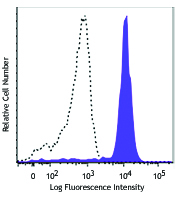
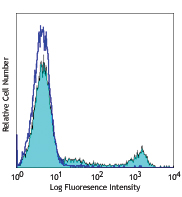
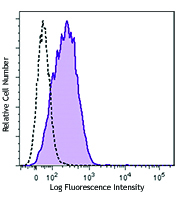
Compare Data Across All Formats
This data display is provided for general comparisons between formats.
Your actual data may vary due to variations in samples, target cells, instruments and their settings, staining conditions, and other factors.
If you need assistance with selecting the best format contact our expert technical support team.
-
PE anti-ASC (TMS-1)
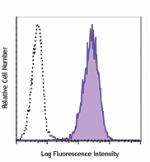
Human acute promyelocytic leukemia cell line, HL-60, was tre...









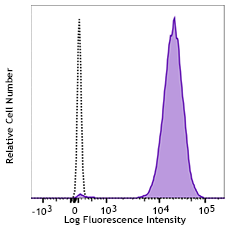



Follow Us